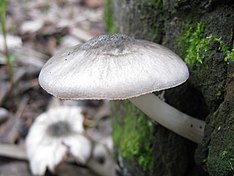Pluteus salicinus
| Pluteus salicinus | |
|---|---|
 |
|
| Scientific classification | |
| Kingdom: | Fungi |
| Division: | Basidiomycota |
| Class: | Agaricomycetes |
| Order: | Agaricales |
| Family: | Pluteaceae |
| Genus: | Pluteus |
| Species: | P. salicinus |
| Binomial name | |
|
Pluteus salicinus (Pers.) P.Kumm. (1871) |
|
| Synonyms | |
|
Agaricus salicinus Pers. (1798) |
|
| Pluteus salicinus | |
|---|---|
| Mycological characteristics | |
| gills on hymenium | |
|
|
cap is convex or flat |
| hymenium is free | |
| stipe is bare | |
| spore print is pink | |
| ecology is saprotrophic | |
|
|
edibility: psychoactive or edible |
Agaricus salicinus Pers. (1798)
Rhodosporus salicinus (Pers.) J.Schröt. (1889)
cap is convex
edibility: psychoactive
Pluteus salicinus is a European psychedelic mushroom that grows on wood. It is an edible mushroom after parboiling.
The species was originally described by Christian Hendrik Persoon as Agaricus salicinus in 1798.Paul Kummer transferred it to the genus Pluteus in 1871.
This mushroom is widely distributed across western Europe and Siberia. It is found on hardwoods - Alnus, Eucalyptus, Fagus, Populus and Quercus.
It is always found growing on wood. Summer-fall, solitary or gregarious on dead wood of hardwoods, in damp forests on flood-plains.
The 'Knackers Crumpet' is a localised, common name referring to Pluteus salicinus. Its use is most prominent in the North of England.
The concentration of psilocybin and psilocin in the dried sample of P. salicinus has been reported in the range of 0.21-0.35 and 0.011-0.05%, respectively.
Pluteus salicinus microscopic features.
...
Wikipedia
